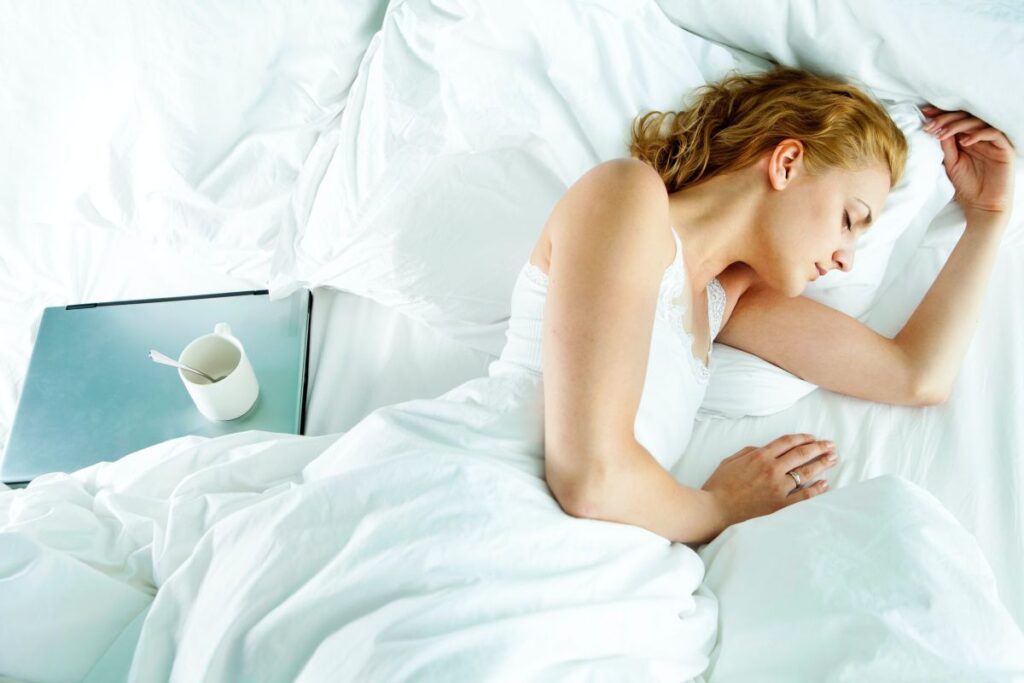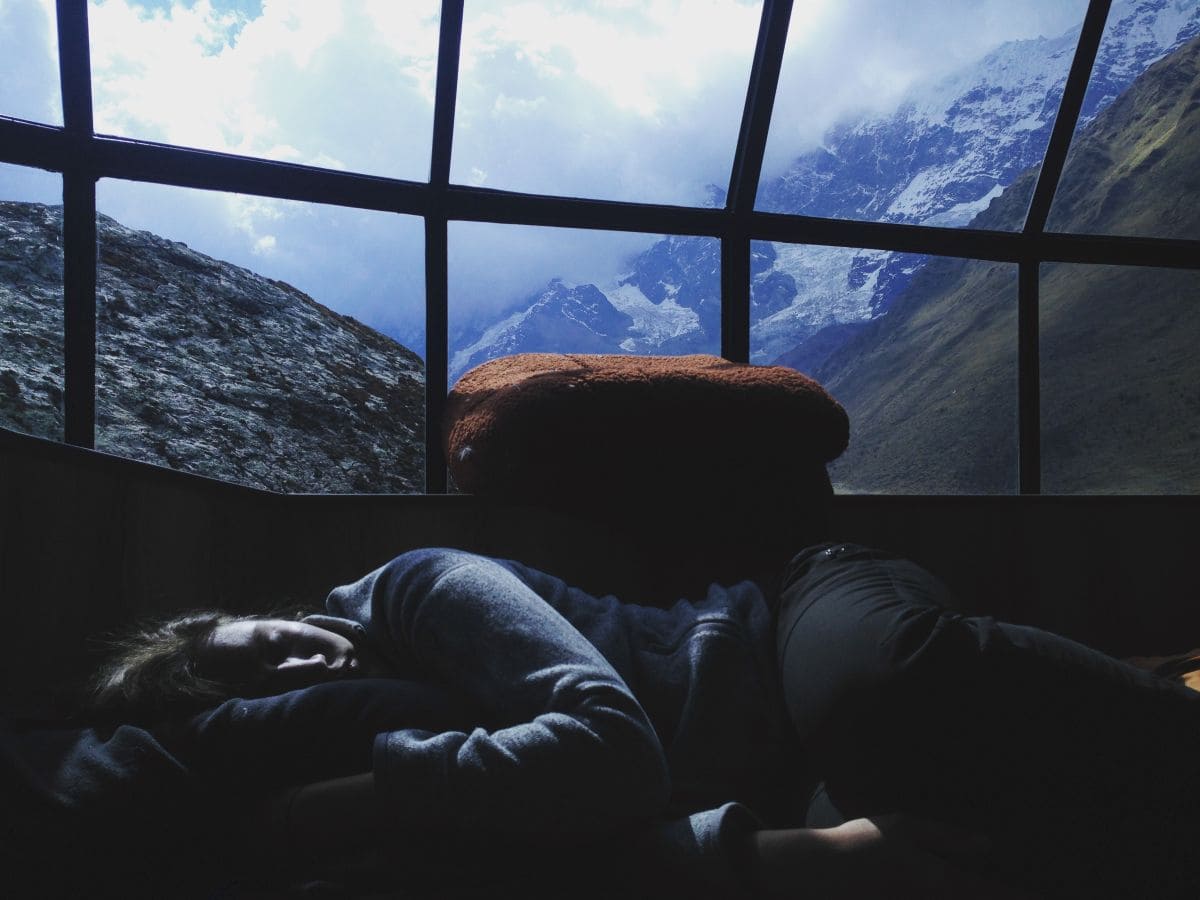Do you ever find that you are drenched in sweat when you wake up in the middle of the night, as if you just finished a race? If this describes your experience, then you are one of the many people who have night sweats or sleep hyperhidrosis. Night sweats are not caused by external factors, such as the temperature of the room you sleep in. Rather, they are most commonly brought on by shifts in hormone levels within the body or are the unintended consequence of taking medication. In either case, they have the potential to significantly disrupt your sleep. Sweating during the night is a common cause of waking up, and in order to get back to sleep in a comfortable position, you may need to change your clothes or your sheets.
Another name for excessive nighttime perspiration or sweating is the condition known as night sweats. They are a frustrating aspect of life for many people and have been linked to feelings of depression as well as an inability to sleep comfortably. Even though night sweats are a typical sign of menopause, there are other conditions and medications, in addition to menopause, that can cause night sweats. Night sweats aren't considered to be a serious symptom in the majority of cases. Even so, it is essential to be aware of when you should seek medical attention if you have night sweats.
Sweating Too Much
- The body naturally cools down by perspiring; as sweat evaporates from the skin, body temperature falls.
- Sweating may temporarily increase in hot environments, during exercise, or in cases of an acute fever or infection.
- However, occasionally people experience abnormal sweating or nighttime sweating that lasts for weeks, months, or even years. They may have night sweats that soak the bed or excessive daytime sweating that drenches clothing and is uncomfortable and embarrassing.
- Here are some of the causes a doctor will take into consideration because chronic (long-term) sweating occasionally can be a sign of a serious underlying illness.
Here’s what you need to know about the common causes of night sweats and when to see a doctor:
Hormonal Disorders
Night sweats are a common symptom of hormonal conditions that make it difficult for the body to maintain its normal temperature. The hypothalamus, a region of the brain that is responsible for hormone production, is responsible for regulating the temperature of the body. When your hormones are out of whack, it is often a sign that your hypothalamus is unable to regulate your body temperature in the correct manner. Some of the hormonal conditions that can lower one's core temperature and lead to nighttime sweating are as follows:
- Hyperthyroidism.
- This condition results in an excessive production of the hormone produced by the thyroid, which leads to increased sweating, including sweating during the night.
- Pheochromocytoma.
- This is a tumour on the adrenal gland, which causes an excessive amount of hormone production. Night sweats and a racing heart are two of the symptoms that you might experience.
- Carcinoid syndrome.
- This is an extremely uncommon disease that has been linked to tumours that occur in the endocrine system. In some people, this can result in an abnormally high level of the neurotransmitter serotonin being produced. An excessive amount of sweating is one of the symptoms.
Talk to your primary care physician if you experience other symptoms of a hormonal imbalance, such as changes in your weight or headaches, and describe these symptoms to them.
Medications
Night sweats can be a side effect of certain medications, including antidepressants that are taken for anxiety or depression. For instance, a study conducted in 2018 discovered that up to 14% of people taking selective serotonin reuptake inhibitors (SSRIs), which are the most common type of antidepressants, experience excessive sweating as well as night sweats. The authors of the study came to the conclusion that these medications most likely affect the regions of the brain that are responsible for the production of hormones, which are involved in the regulation of temperature and sweating.
Other medications that may cause night sweats to include:
- Diabetes medications, like Metformin or insulin (if you’re taking these, check your blood sugar to ensure that it isn’t too low and causing the night sweats)
Stress & Anxiety
An increase in the production of adrenaline may result in hyperventilation, a rapid heartbeat, and increased sweating. Other symptoms of anxiety include chest tightness, palpitations, tremors, nausea, diarrhoea, feelings of dread and fear, and tightness in the throat and jaw.
Heart Problems
Sweating is a common symptom of a number of heart conditions. Sweating is one of the indicators that someone is having a heart attack. In most cases, additional symptoms appear, including chest pain (or tightness) that may spread to the jaw and left arm, nausea, and occasionally shortness of breath and weakness.
Obesity
People who are significantly overweight are more likely to have problems with excessive sweating. What are the possible red flags that it might be a more serious problem? Anyone who is experiencing excessive sweating should consult a medical professional as soon as possible. This is especially important if the perspiration is intense or if there are other concerning symptoms present, such as the following:
- Weight loss
- Fevers
- Exhaustion
- Chest or back pain
- Rapid heartbeat
- Shortness of breath
Night Sweats
What kinds of diagnostic procedures ought to be carried out in cases of profuse sweating or nighttime sweating? Your doctor will typically perform a comprehensive physical exam on you because there are so many potential causes of sweating. This exam will include taking your pulse, temperature, and blood pressure, in addition to evaluating your abdomen, chest, and heart. Depending on the patient's medical history and the findings of the physical exam, the doctor will typically order blood tests to check for one or more of the conditions described above. X-rays, scans, and possibly even other types of investigations might be required as well.
Remedies
You will be able to treat your night sweats once the underlying cause of them has been identified. It is common practise to treat hormone imbalances with hormone replacement therapy. In addition, the effects of hormone imbalances can be mitigated by reducing the amount of alcohol that is consumed. If the problem can be traced back to a specific medication, speaking with your primary care physician about it can also be helpful; he or she may be able to recommend other options. Consultation with a medical professional about your night sweats may also assist in the diagnosis of a more serious underlying condition and lead you to seek treatment for the condition as necessary.
Night sweats are a common source of discomfort for those who experience them, despite the fact that they rarely indicate a serious health problem on their own. Alterations in behaviour may be able to ameliorate the symptoms of certain causes, such as hormone imbalances, while other causes, such as genetics, may be unavoidable.
Heatstroke And Heat Exhaustion
In hot weather, heatstroke, also known as sunstroke, can occur when an insufficient amount of sweat is produced to adequately cool the body. Symptoms may include the following:
- muscle cramps
- headache
- nausea
- vomiting.
Heat exhaustion is a potentially fatal condition that can develop when an individual loses excessive amounts of body salts and water. Finding a cool, shady place to rest, drinking a lot of fluids, and, if necessary, sponging the body with water can help manage the effects of heatstroke and prevent the heat exhaustion that can result from it.
Can Night Sweats Be Prevented?
Seek immediate medical attention if you have any reason to believe that the night sweats you have are caused by an infection or another illness. Talk to your primary care physician about your specific condition, the different treatment options available, and preventative measures you can take to stop night sweats.
Conclusion
Lack of control over your sleeping environment is not a factor in night sweats. Instead, changes in hormone levels within the body are the most common cause of these symptoms. Insomnia is a common symptom of menopause, but it can also be brought on by other medical issues or medications. Hormonal conditions that disrupt the body's ability to regulate its temperature frequently cause night sweats. Some medications, such as antidepressants for anxiety or depression, can cause night sweats as a side effect.
Perspiring is a sign of a heart attack. Excessive sweating is more common in people who are significantly overweight. If you're experiencing night sweats, it's best to talk to a doctor about it. Heatstroke occurs when the body overheats because it is not producing enough sweat to keep it cool. Exhaustion from heat can be fatal if it causes you to lose too much salt and water from your body. When suffering from heatstroke, it is important to find a cool, shady place to rest and drink plenty of fluids.
Content Summary
- Do you ever wake up in the middle of the night drenched in sweat, as if you had run a race?
- If this sounds like you, you may be one of the millions of people who suffer from night sweats, also known as sleep hyperhidrosis.
- Rather, they are usually the unintended result of medication or the result of a change in the body's hormone levels.
- It's possible that either one of them will keep you from getting a good night's rest.
- Night sweats is another name for excessive perspiration or sweating that occurs during sleep.
- Night sweats are a common symptom of menopause, but they can also be caused by other medical issues or medications.
- Most of the time, night sweats aren't seen as a serious symptom.
- Nonetheless, it is crucial to know when to seek medical attention if you have night sweats.
- Read on to learn about the most common causes of night sweats and when you should visit a doctor:
- Hormonal conditions that disrupt the body's ability to regulate its temperature frequently cause night sweats.
- Here are a few examples of hormonal disorders that can cause you to sweat excessively at night:
- You might experience night sweats and a racing heart as symptoms.
- Having the syndrome of carcinoid is alarming.
- Extreme perspiration is a symptom.
- If you've noticed other signs of a hormonal imbalance, like shifts in your weight or frequent headaches, it's time to schedule an appointment with your primary care doctor and explain what's going on.
- Some medications, such as antidepressants used to treat anxiety or depression, can cause night sweats as a side effect.
- The sweating is one of the symptoms of heart problems.
- Anyone experiencing severe perspiration needs to see a doctor immediately.
- Due to the wide variety of possible causes, your doctor will likely perform a thorough physical examination.
- Once the cause of your night sweats has been determined, you will be able to treat them.
- Discussing your night sweats with a doctor can rule out less serious causes and lead to prompt treatment if necessary.
- Heat exhaustion can be avoided or managed by resting in a cool, shady area, drinking plenty of fluids, and, if necessary, sponge bathing the body with water.
- Do Anything to Stop Night Perspiring?
- If you suspect that your night sweats are due to an infection or another illness, you should see a doctor right away.
- Consult your primary care physician to learn more about the causes of your night sweats, the best course of treatment for your unique case, and any preventative measures you can take.
- The cause of your night sweats may be something your primary care doctor can help you identify.
- Depending on the root cause of the problem, they may recommend a change in lifestyle, medication, or other treatments.
FAQs About Causes Of Night Sweats
Your sleepwear and sleep environment, bedding, sleepwear or even a mattress that doesn’t “breathe” A sleep environment that’s too warm.
Having night sweats a few times is usually nothing to worry about. But talk to your doctor if you often have night sweats or have other symptoms along with them. These might include fever, chills, pain, or unexpected weight loss.
Night sweats aren’t usually a cause for concern. In some cases, though, they may be a sign of an underlying medical condition that requires treatment. For example, night sweats are common in menopause, which usually starts around age 50. However, if you experience night sweats and other menopause symptoms before turning 40, it’s important to talk with your doctor. This may indicate a condition called primary ovarian insufficiency.
It’s also important to seek medical attention if you develop night sweats that frequently happen, disturb your sleep, or are accompanied by other symptoms. For example, night sweats that occur with a high fever, cough, or unexplained weight loss may signify a serious medical condition. In addition, in those with lymphoma or HIV, night sweats may indicate that the condition progresses.
To lower your risk of experiencing night sweats:
- limit your consumption of alcohol and caffeine.
- Avoid using tobacco and drugs.
- Sleep in a cooler environment.
- Consider getting a cooling mattress.
- Try to maintain a moderate weight.
- Avoid eating spicy food if you have menopause, as it can worsen symptoms.
Leukemia and lymphoma are among the cancers associated with night sweats. Those associated with leukemia usually occur in conjunction with symptoms such as fatigue, weight loss, or excessive bruising. Leukemia-related sweats may also result from daytime fevers.
Most people go through stages of dehydration throughout the day if they aren’t drinking water regularly. If you’re partially dehydrated when you go to bed, you’ll likely sweat less. But if you’re well-hydrated, the chances are that you’ll sweat more. Night sweats vary in intensity for this reason.


